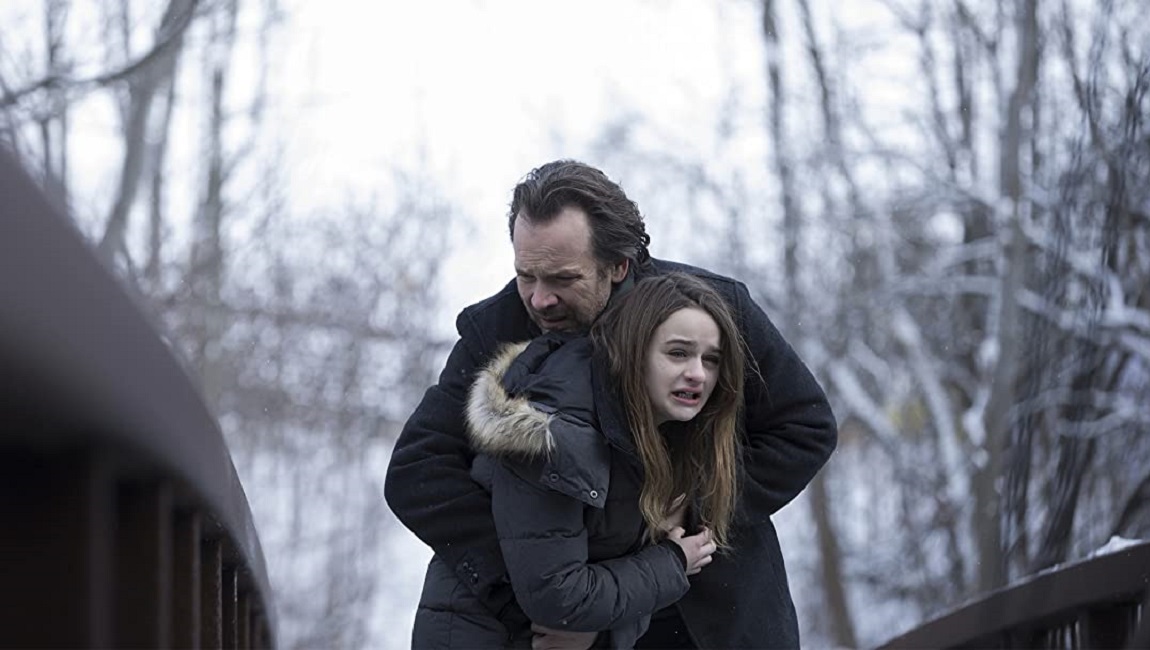Songbird is a well-directed but otherwise bland, opportunistic bit of pablum.
The press materials for the new COVID thriller Songbird spill a lot of ink on the filmmakers patting themselves on the back for creating a movie about “hope” and “resilience” in the middle of a global pandemic. It’s worth asking why they felt compelled to make anything at all, particularly such a bland, familiar, YA-inflected bit of star-crossed-lovers pablum like this. Setting aside whether it’s a good idea or not, or even moral (a big ask, frankly), Songbird only really makes sense as low-budget exploitation, like an old made-for-TV movie ripped from the headlines or a vintage Arkoff or Corman drive-in quickie that wanted to advertise its novelty factor. The best thing that can be said about Songbird is that it at least looks and feels like an actual movie, albeit a bad one, despite the unique provenance of its creation (although not that unique, not anymore, as many movies and television projects have since resumed production).
In this alternate reality, COVID-19 has mutated into COVID-23, causing something like one hundred million deaths worldwide. Most people live in perpetual lockdown, while a handful of immune folks traverse once-vibrant cities with special wristbands indicating their immunity status. One such “munnie,” as they are referred to in the movie, is beefy boy-toy Nico (KJ Apa), who works as a bike messenger for Lester (Craig Robinson), squiring packages all over an empty, desiccated L.A. Even in the midst of an apocalyptic pandemic, the rich can still get whatever they want, apparently. Nico is saving his money up for fake credentials to get his girlfriend Sara (Sofia Carson) away from the city to a “free zone.” Meanwhile, the Department of Sanitation, led by that strangest of “hey-that-guy” character actors Peter Stormare, has been weaponized; anyone who tests positive during daily temp checks is dragged away by armed stormtroopers and left to die in “Q zones,” which look suspiciously like concentration camps. It’s an example of the kind of logistical questions that the film can’t be bothered to answer, and it’s impossible to glean any kind of coherent political position from its confused scenario. It’s certainly alarmist, but only in the dumbest sense, extrapolating current events into Walking Dead territory (minus the zombies). Meanwhile, Nico’s travels have him cross paths with a rich couple (Demi Moore and Bradley Whitford, presumably picking up easy paychecks), and there’s also a weird subplot shoehorned in about a musician/cam girl (Alexandra Daddario) and a wheelchair-bound drone pilot (the always welcome Paul Walter Hauser). It doesn’t make a ton of sense, and screenwriter Simon Boyes contorts himself trying to tie all these loose threads together.
At least director Adam Mason and cinematographer Jacques Jouffret invest the proceedings with a ton of energy, channeling the hyper-kinetic style of producer Michael Bay’s best work. Almost every scene here is mediated by screens, as people communicate via phones, tablets, drones, and security cameras. It’s a phalanx of digital images, a tapestry of technology with a frenzied editing style to match, and very much of a piece with other movies that InRO editor-in-chief Luke Gorham has dubbed “telecom cinema” (think Unfriended and its ilk). There’s a fascinating ephemeral quality to the digitized images, a sketchy, fuzzy surface effect that becomes a kind of pliable metaphor for distanced interpersonal relationships. This aesthetic leaning helps the early goings of Songbird to remain quite a bit of fun, but the plot inevitably kicks in, and the film grinds towards its forgone conclusion. The overwhelming feeling one is left with is that all this creative energy could have been put to better use elsewhere, and that Mason & Co. were so clearly preoccupied with whether or not they could do it that they didn’t stop to think about whether they should do it.
Published as part of Before We Vanish | December 2020 — Part 1.







